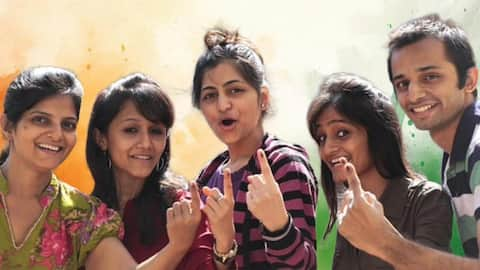Lok Sabha elections 2024: Know your voting rights and responsibilities
What's the story
Voting is both a fundamental duty and a powerful instrument for citizens to shape governance. The right to vote is enshrined in the Constitution of India, which establishes a democratic framework where the government is elected by its people. However, the effectiveness of voting depends largely on the awareness and understanding voters have about their rights. Here's what every Indian voter should know.
Eligibility
Voter registration: Your responsibility at the age of 18
A citizen becomes eligible to register as a voter at the age of 18 as of January 1 of the year the electoral rolls are prepared. These rolls are updated every five years and also before any election. Although the Election Commission conducts periodic door-to-door enumeration, it is ultimately your responsibility to ensure you are registered to vote.
Single place
Remember, you can be registered only at one place
If you are 18 years or older as of January 1, 2024, you are eligible to participate in the current general elections. However, it's crucial to understand that you can only be registered to vote in one location; registering in multiple places is illegal. You must enroll as a voter at your ordinary place of residence, which is the constituency where you currently live.
Form 8
Updating voter registration: Form 8 and ID requirements
If you have shifted residences within the same constituency, you can use Form 8 to update your details, facilitating the transfer of your voter registration from one address to another. Additionally, voters must present either the Electors Photo Identity Card (EPIC) issued by the Commission or another valid identification document as prescribed. Ration cards are not accepted as valid identification for voting purposes.
Identification
You can use alternative proofs to caste your vote
To cast your vote without a voter ID, you can use alternative documents such as an Aadhaar card, MNREGA job card, a health insurance smart card, a driving license, PAN card, a passport, a pension document with a photograph, or an identity card issued by any Central or State government agency, including those issued to MLAs or MPs.
Name registration
ID alone doesn't guarantee voting rights
Having a voter ID card or a document prescribed by the Election Commission does not automatically entitle you to vote. It's crucial to ensure that your name is listed on the electoral rolls. Once you confirm that your name is included and you have a valid identification document as specified by the Election Commission, you are eligible to vote.
Malpractices
You can file a complaint during election. Here's how
To file a complaint regarding electoral matters, you can reach out to your Electoral Registration Officer (ERO) directly, or utilize the National Grievance Services portal. You can use the cVIGIL, a citizen mobile application, to capture an image or a video of the malpractice that you witnessed, and the Election Commission assures of a reply specifying the action taken within 100 minutes.
Wrong button
What to do on pressing a wrong button on EVM
In the event that you accidentally press the wrong button on the Electronic Voting Machine (EVM) while casting your vote, don't panic. Approach the polling officer immediately and explain the situation. They will assist you by resetting the machine, allowing you the opportunity to cast your vote again accurately. Electoral officials are there to ensure that every voter's voice is heard effectively.
Abstain to vote
Your right to 'refuse to vote'
Many voters are unaware of their right to "refuse to vote" even after registering with the presiding officer. Electors can abstain from voting at the polling booth. Unlike the NOTA (None Of The Above) option, which allows voters to express lack of confidence in candidates, the "refusal to vote" option lets an elector entirely opt out of the polling process.
